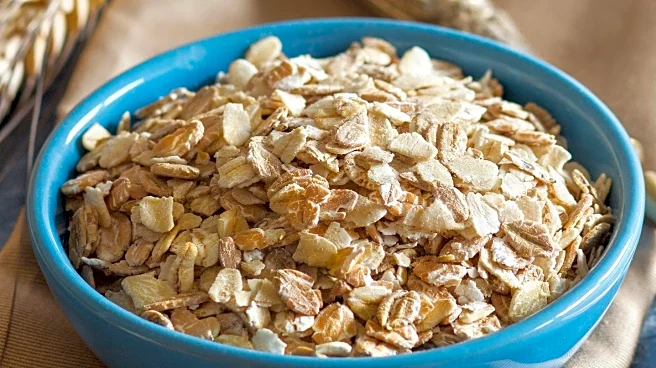What's Happening?
Fibermaxxing is a new trend gaining popularity, particularly on TikTok, which emphasizes the intentional incorporation of high-fiber foods into daily diets. The trend advocates for consuming the recommended
daily intake of fiber, which is crucial for various health benefits such as stabilizing blood sugar, supporting digestion, and feeding gut bacteria. Functional medicine expert Alex Manos suggests aiming for 30 grams of fiber per day and consuming a variety of 30 different plants weekly to support microbiome and metabolic health. Despite the guidelines suggesting 25 to 30 grams for women and 30 to 40 grams for men, nutritional therapist Phoebe Liebling notes that these recommendations lack nuance, particularly in differentiating between soluble and insoluble fiber.
Why It's Important?
The fibermaxxing trend highlights a significant shift towards health-conscious eating habits, addressing the common issue of insufficient fiber intake among Americans. By promoting a diverse and adequate fiber consumption, the trend could lead to improved digestive health, better blood sugar regulation, and lower cholesterol levels. This movement aligns with the broader push for functional nutrition, which prioritizes foods that offer specific health benefits. As more individuals adopt fibermaxxing, there could be a positive impact on public health, potentially reducing the prevalence of diet-related conditions such as diabetes and heart disease.
What's Next?
As fibermaxxing continues to gain traction, it is likely that more educational content and products focused on high-fiber foods will emerge. Nutritionists and health experts may further refine guidelines to better distinguish between types of fiber and their specific benefits. Additionally, food manufacturers might respond to this trend by developing new products that cater to the demand for fiber-rich options, potentially influencing market dynamics in the health food sector.
Beyond the Headlines
The fibermaxxing trend also raises awareness about the importance of gut health and its connection to overall well-being. By encouraging a varied intake of plant-based foods, it supports biodiversity in the diet, which is crucial for a healthy microbiome. This focus on gut health could lead to broader discussions about the role of diet in mental health, immune function, and chronic disease prevention.









